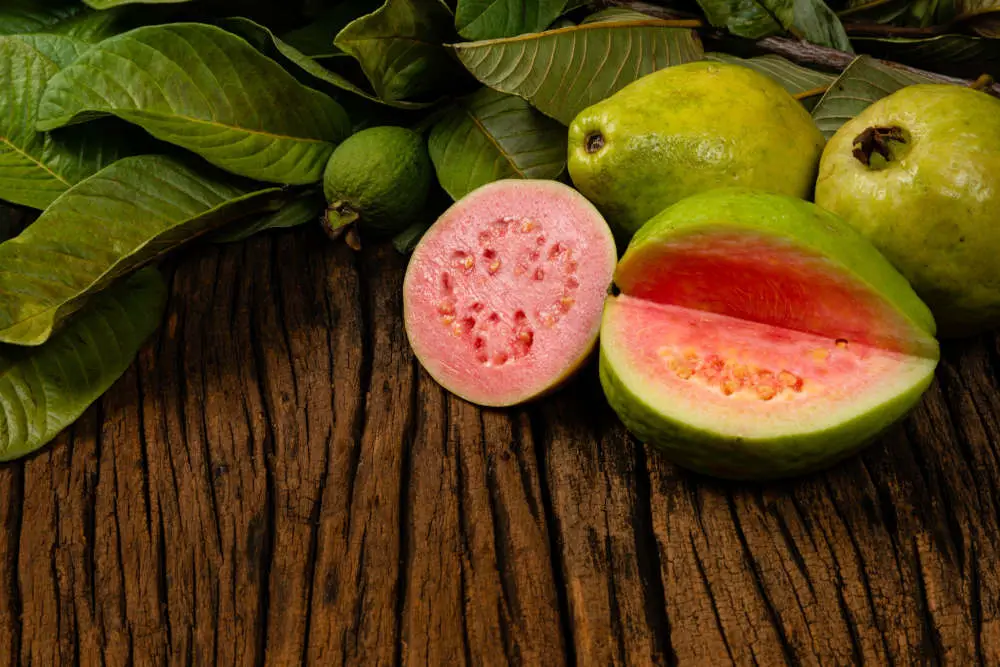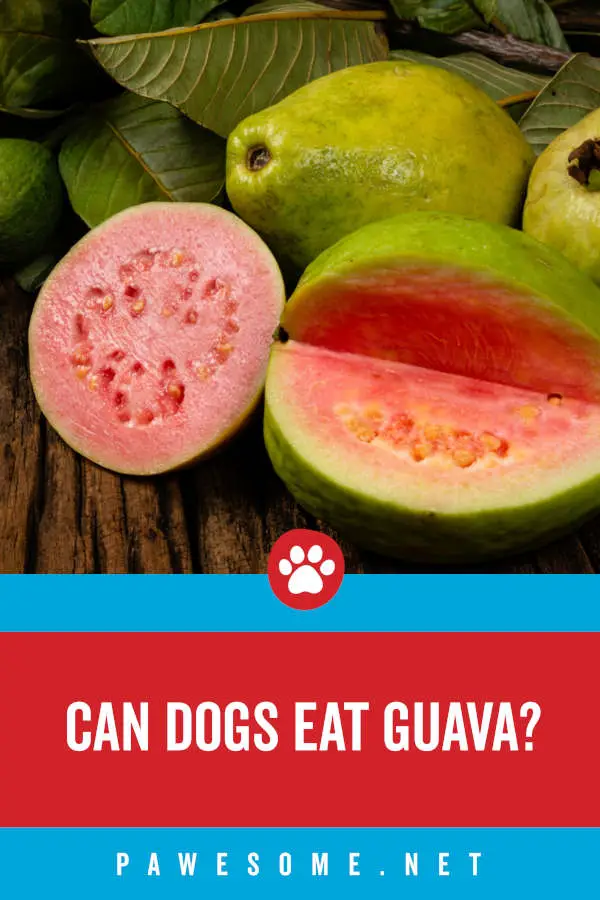
When it comes to our beloved pets, we often find ourselves questioning whether a particular food is safe for them to eat. One such question is: can dogs eat guava? This tropical fruit, native to Central and South America, is packed with essential nutrients and has become increasingly popular among health-conscious humans. But how does it fare when it comes to our canine companions?
The short answer is yes, dogs can safely enjoy guava in moderation. However, there are some important considerations to keep in mind. In this article, we’ll explore the benefits and precautions of feeding guava to your four-legged friend.
Benefits of Guava for Dogs
- Rich in Vitamins and Minerals: Guavas are an excellent source of vitamins and minerals, including vitamin C, vitamin A, potassium, and dietary fiber. These nutrients support the immune system, promote healthy skin and coat, and aid in digestion.
- Antioxidant Properties: Guavas are also rich in antioxidants, which can help protect your dog’s cells from damage caused by free radicals. This may reduce the risk of chronic diseases and improve overall health.
- Low-Calorie Treat: With its low-calorie count and natural sweetness, guava makes for a delicious and healthy treat for dogs that won’t contribute to weight gain when fed in moderation.
Precautions and Tips for Feeding Guava to Dogs
Remove the Seeds
Guava seeds can pose a choking hazard, particularly for smaller dogs. Make sure to remove the seeds before feeding guava to your pet. Alternatively, you can opt for seedless guava varieties to eliminate this risk.
Limit the Amount You Give Your Dog
While guava is nutritious and generally safe for dogs, it should be offered as an occasional treat and not a staple in their diet. Too much guava can cause gastrointestinal upset and diarrhea, so moderation is key.
Introduce Gradually
As with any new food, it’s important to introduce guava gradually into your dog’s diet. Start with a small piece and monitor your pet for any signs of discomfort or allergies. If they show no adverse reactions, you can slowly increase the portion size.
Opt for Fresh Guava
Always choose fresh, ripe guava over canned or processed varieties. Processed guavas may contain added sugars and preservatives that are not suitable for dogs.
Always remember: If your dog has pre-existing health conditions or is on a special diet, it’s always best to consult your veterinarian before introducing new foods.
Also Read: Can Dogs Eat Nopales?
Exploring Different Types of Guava
Before we wrap up, let’s take a moment to explore the various types of guava available. While there are many guava varieties, some of the most common ones include apple guava, pineapple guava, Thai guava, white guava, and red guava. Each type has its unique flavor, texture, and nutritional profile. When offering guava to your canine companion, it’s essential to consider these differences.
- Apple Guava: Also known as common guava, this type is the most widely available variety. Apple guava has a sweet and slightly tangy flavor, with a texture similar to that of a pear. Its skin can be yellow or green, while the flesh is usually white, pink, or red. Apple guava is safe for dogs when seeds are removed and fed in moderation.
- Pineapple Guava: This variety, also known as feijoa, is native to South America. It has a unique taste that combines the flavors of pineapple, strawberry, and guava. The flesh is slightly gritty, and the skin is not typically eaten. Pineapple guava can be a safe treat for dogs, but make sure to remove the skin and seeds before feeding.
- Thai Guava: Thai guava, sometimes referred to as Farang guava, is a large, crunchy variety with a mild and slightly sweet taste. It has a greenish-white flesh and is often eaten with a spicy dipping sauce in Thailand. Since Thai guava is less sweet than other varieties, it could make a suitable low-sugar treat for dogs when seeds are removed.
- White Guava: This type of guava has a creamy white flesh and a sweet, aromatic flavor. The skin is light green, and the seeds are small and soft. When feeding white guava to your dog, it’s still a good idea to remove the seeds, even though they may be softer than other varieties.
- Red Guava: Red guava is known for its deep pink or red flesh, which is both sweet and slightly tangy. This variety is rich in antioxidants, thanks to its vibrant color. As with other guavas, remove the seeds before offering red guava to your dog.
When trying out different guava varieties for your pet, always remember to follow the precautions mentioned earlier in this article. Each dog may have its preferences, so it’s essential to pay attention to your pet’s reaction and adjust accordingly.
Also Read: Can Dogs Eat Canary Melon?
Guava Rind, Leaves, and Other Guava Products: Are They Safe for Dogs?
Now that we’ve discussed the various types of guava, you might be wondering about other parts of the fruit or guava-based products. In this section, we’ll address the safety of guava rind, leaves, and some common guava products for your canine companion.
Guava Rind
Guava rind or peel is generally safe for dogs to consume in small amounts. It contains fiber and other nutrients that can be beneficial. However, it’s important to wash the rind thoroughly to remove any pesticides or dirt before offering it to your dog. Keep in mind that some dogs might find the rind’s texture unappealing, and it could cause gastrointestinal discomfort if consumed in large quantities.
Guava Leaves
Guava leaves are not recommended for dogs. While they have been used in traditional medicine for humans, there is not enough research on their safety and potential side effects for canines. It’s best to err on the side of caution and avoid feeding guava leaves to your pet.
Dried Guava
Dried guava can be fed to dogs in moderation, but it’s essential to ensure that no added sugars or preservatives are present. Keep in mind that dried fruits have a higher sugar concentration than their fresh counterparts, so be cautious with portion sizes to prevent excessive sugar intake.
Guava Yogurt
Feeding guava yogurt to your dog is not recommended. Many commercial yogurt products contain added sugars and artificial sweeteners that can be harmful to dogs. Additionally, some dogs may be lactose intolerant, which could lead to gastrointestinal upset if they consume yogurt.
Also Read: Can Dogs Eat Strawberry Yogurt?
Guava Paste
Guava paste, also known as goiabada, is a concentrated guava product commonly used in desserts and cooking. It typically contains a high amount of added sugar and is not suitable for dogs. Excessive sugar consumption can lead to obesity, dental issues, and other health problems in pets. Avoid feeding guava paste to your dog.
While the guava rind can be safe for dogs in small quantities, it’s best to avoid guava leaves and guava-based products like yogurt and paste. Always prioritize fresh, ripe guava without seeds when offering this fruit to your furry friend.
Final Thoughts
Guava can be a nutritious and delightful treat for your dog when fed in moderation and with proper precautions. By removing the seeds, limiting the amount, and introducing the fruit gradually, you can safely incorporate guava into your dog’s diet. While the guava rind may be safe in small quantities, it’s best to avoid guava leaves and guava-based products like yogurt and paste. Each dog may have its preferences, so pay attention to your pet’s reaction and adjust accordingly.
As with any new food, always consult your veterinarian if you have any concerns or questions about feeding guava or other new food to your pet. By staying informed and taking a cautious approach, you can help ensure that your dog enjoys a happy, healthy, and diverse diet. Happy snacking!

